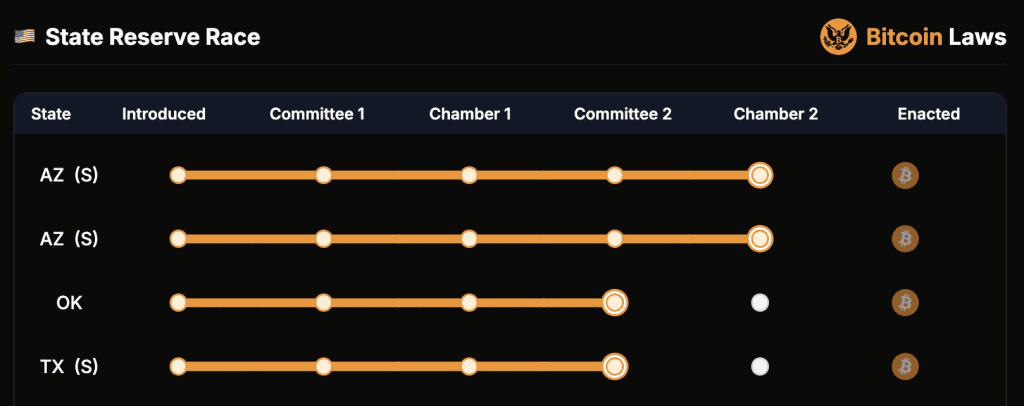- Kentucky Governor Andy Beshear signs the “Bitcoin Rights” bill, protecting crypto users’ rights to self-custody, run nodes, and use digital assets without discrimination.
- House Bill 701 (HB701) passed unanimously in both Kentucky’s House and Senate, solidifying the state’s crypto-friendly stance.
- The bill clarifies mining, staking, and node operations, ensuring they’re not classified as securities, and exempts mining from money transmitter licenses.
Kentucky Governor Andy Beshear has formally signed the “Bitcoin Rights” bill into law, which cements protection for crypto users in the state. The law, which is formally titled House Bill 701 (HB701), codifies the right to self-custody, operate a crypto node, and utilize digital assets free from discrimination.

The bill, which was first introduced by Rep. Adam Bowling on Feb. 19, is a sure step forward for Kentucky’s crypto-friendly image. As the Satoshi Action Fund pointed out in a March 24 release, the bill ensures that Kentuckians can freely engage with digital assets and utilize self-custody wallets, while also safeguarding them against any local zoning changes that would be inimical to crypto mining activities.
We are proud to officially announce that ‘Bitcoin Rights’ has been SIGNED INTO LAW by the Governor of Kentucky!
— Satoshi Action Fund (@SatoshiActFund) March 24, 2025
The right to self-custody, run a node, and use of digital assets is now protected for millions of Americans without fear of discrimination.
This effort would not… pic.twitter.com/ETH2I4CWw6
Kentucky Advances Bitcoin Reserve Initiative with HB701
HB701 gives explicit guidance on running a cryptocurrency node and expressly clarifies that the activities of mining and staking do not amount to offering or selling securities. In addition, it excludes crypto mining businesses from money transmitter licensing, providing regulatory certainty to those entering the space.
The bill was enacted with broad bipartisan support, sweeping through the Kentucky House of Representatives in a 91-0 unanimous vote on Feb. 28. It went through the state Senate with a 37-0 vote on March 13 before being signed into law by Governor Beshear on March 24.
Kentucky’s new legislation tracks closely on the heels of similar efforts by other states, most prominently Oklahoma, where Governor Kevin Stitt signed BTC legislation into law in May 2024. In so doing, Kentucky becomes the latest state to advance policy that draws Bitcoin and digital assets into its regulatory perimeter.
Beyond the “Bitcoin Rights” bill, Kentucky is also looking at establishing a Bitcoin reserve. If enacted, this measure would allow the State Investment Commission to invest up to 10% of excess state funds into digital assets such as Bitcoin. Still in review, the proposal highlights Kentucky’s growing dedication to incorporating Bitcoin into its financial strategies.
Oklahoma Advances Bitcoin Reserve Bill as House Approves Measure
Meanwhile, Oklahoma is also advancing its Bitcoin-related initiatives. The state’s House Bill 1203, also known as the Strategic Bitcoin Reserve Act, has passed the House of Representatives by a 77-15 vote. Introduced on January 15 by state Representative Cody Maynard, the bill would create a state Bitcoin reserve. Having passed the Government Oversight Committee by a 12-2 vote on February 25, the bill now goes before the Senate for consideration.
HB 1203 Bitcoin Strategic Reserve has passed the House in Oklahoma 77-15! 🥳🥂
— Oklahoma Bitcoin Association (@oklahomabtc) March 24, 2025
Huge congratulations to Rep. Cody Maynard, next stop Senate! pic.twitter.com/IYrWCZFlcf
This legislation has garnered significant attention from the crypto advocacy group the Oklahoma BTC Association and has positioned Oklahoma favorably in the Bitcoin reserve race, alongside Texas. Arizona is still ahead, however, with two separate Bitcoin reserve bills clearing the Arizona House Rules Committee on March 24.
Bitcoin Laws, a group that tracks Bitcoin legislation, said Oklahoma’s Republican-held Senate and Governor likely make it a good wager for the bill to be signed into law. Missouri is also looking at its own Bitcoin reserve bill, with the state’s Special Committee on Intergovernmental Affairs currently weighing the proposal.

As the movement to include Bitcoin in state reserves gains momentum, the growing number of states considering Bitcoin-related bills demonstrates a broader trend of increased acceptance of cryptocurrency in the United States. With Kentucky’s “Bitcoin Rights” bill now a law and other states rushing similar bills through, the future of BTC as a component of the state financial system seems brighter than ever.
Related | IMF Recognizes Bitcoin as a Key Digital Asset in Global Financial Framework
How would you rate your experience?






